Previziunile din 2016 ale multipremiatului jurnalist american John Pilger se adeveresc. În documentarul său The coming war on China, Pilger avertiza încă de acum 6 ani că SUA pregătesc temeinic și pe ascuns de ani de zile o campanie militară de pus China cu botul pe labe. Merită să vedeți acest documentar excepțional pe Netflix.
China a fost mereu adevăratul dușman al SUA, lucru rostit pe guriță fără prea multe menajamente chiar de Donald Trump care a acuzat China de “viol comercial”:
Lucrurile arată însă tot mai rău pentru pacea lumii. Pentru foarte mulți oameni de pe planetă, știrile despre summit-urile NATO sunt atât de plictisitoare, încât foarte puțini le bagă în seamă.
Și presă din România s-a “nevoit” să acopere evenimentul de la Madrid, de acum câteva zile, când liderii țărilor membre ale alianței Nord-Atlantice s-au întâlnit într-un summit istoric.
Unii ziariști mai sugubeti au poreclit acest summit drept “summit-ul nevestelor”, având în vedere puzderia de “prime doamne” care au aterizat la Madrid, subiectul rochiei până la genunchi a doamnei Carmen Iohannis transformând dezbaterea despre summit ce ar fi trebuit să fie serioasă într-o poveste tabloidă. Că atâta poate presa românească.
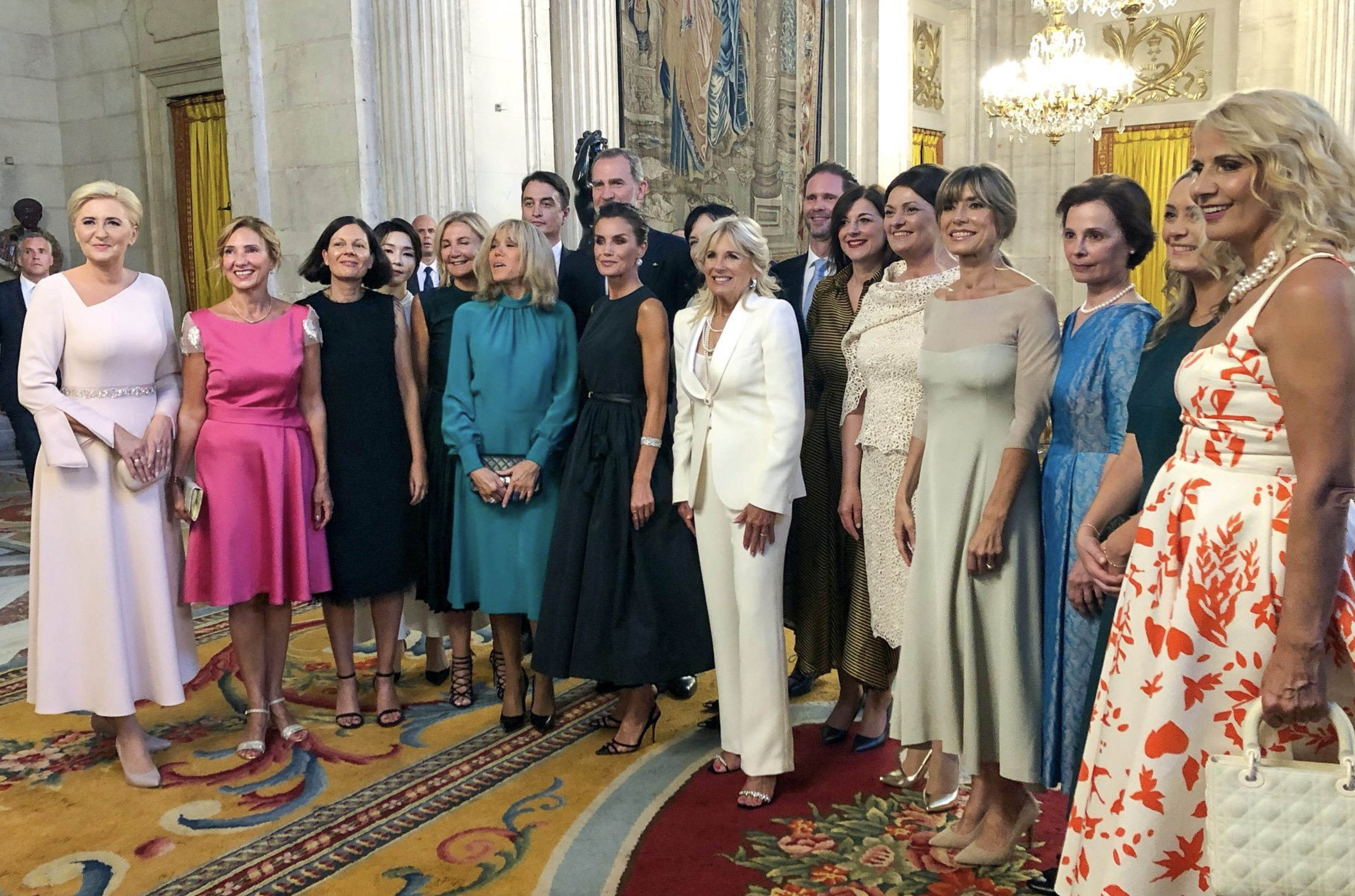
Dar vă dezvăluim câteva lucruri îngrijorătoare care s-au întâmplat la acest summit. Peste zâmbetele din fața camerelor de luat vederi, liderii țărilor membre NATO au discutat la modul cel mai pragmatic despre viitorul planetei
La încheierea summitului NATO de la Madrid, membrii NATO, inclusiv majoritatea statelor europene, precum și Statele Unite și Canada, au adoptat un document strategic care descrie planurile de militarizare a continentului european, de escaladare masivă a războiului cu Rusia, și de pregătire pentru războiul cu China.
Am citit documentul și vi-l prezentăm și dumneavoastră, ca să vedeți că nu discutăm despre scenarii și conspirații: totul e scris pe hârtia semnată de membrii NATO care au lansat așa-numitul “Concept Strategic NATO – 2022”.
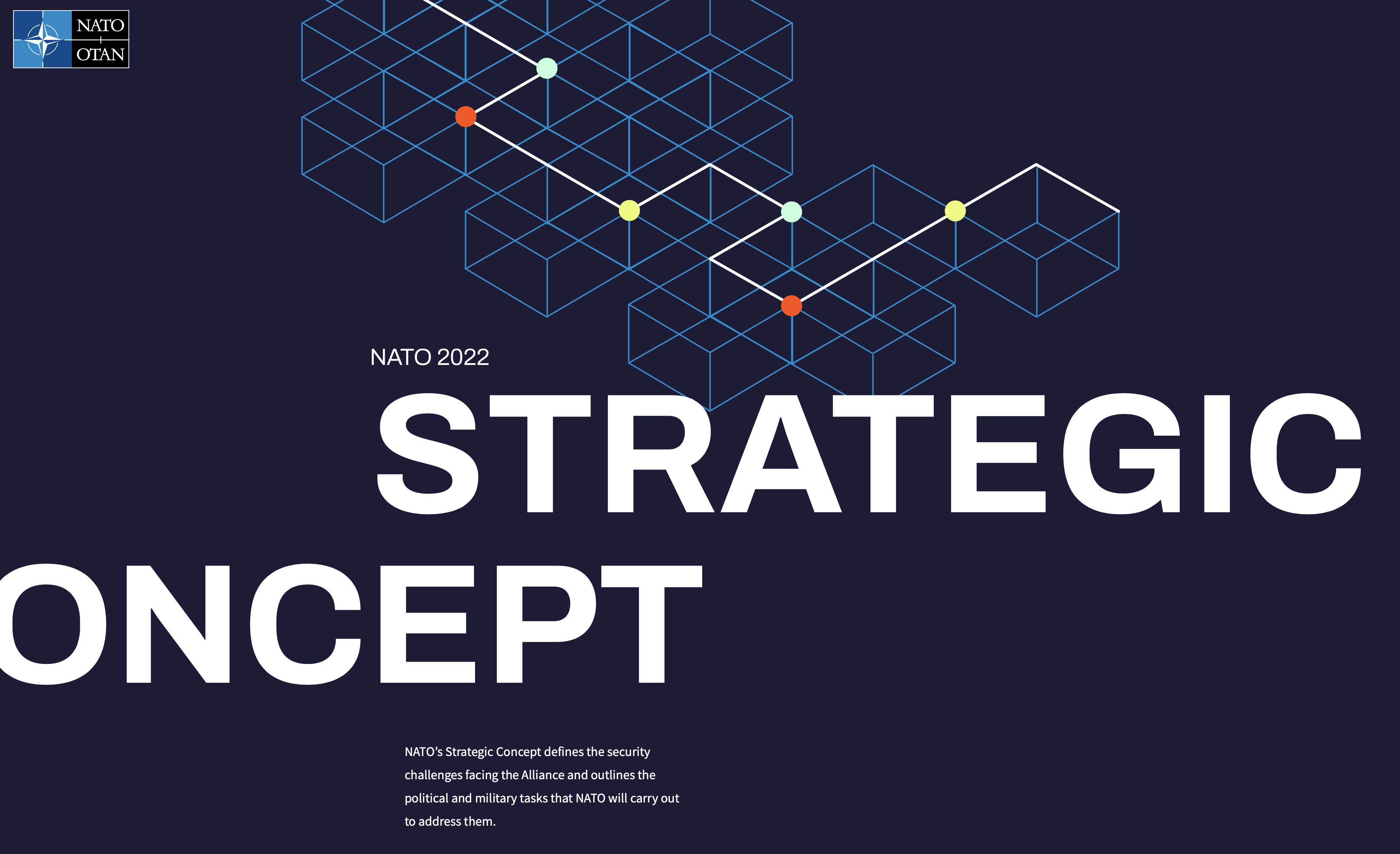
Conceptul strategic este un document-cheie pentru Alianță, al doilea ca importanță numai după Tratatul fondator al NATO. Acesta reafirmă valorile și scopul NATO și oferă o evaluare colectivă a mediului de securitate.
“De asemenea, stimulează adaptarea strategică a NATO și ghidează viitoarea sa dezvoltare politică și militară. De la sfârșitul Războiului Rece, acesta a fost actualizat aproximativ la fiecare 10 ani, pentru a ține cont de schimbările aduse mediului de securitate global”, se spune în noul concept strategic asumat la Summitul de la Madrid din iunie 2022.
Semnatarii documentul se angajează să „furnizeze întreaga gamă de forțe” necesare „pentru lupte de mare intensitate, pe mai multe domenii, împotriva concurenților cu arme nucleare”.
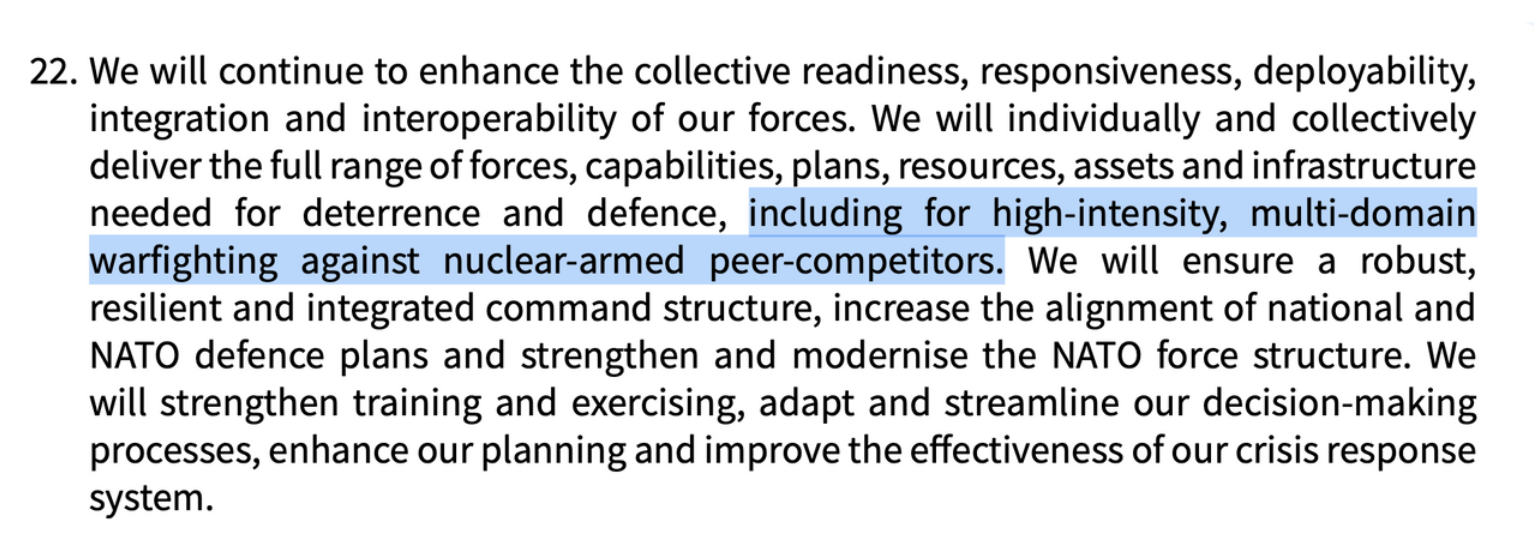
Într-o schimbare radicală față de ultimul document de strategie, publicat pentru prima dată în 2010 la Lisabona, noul document de strategie NATO proclamă că „zona euro-atlantică nu este calmă” (“to be at peace” are acest sens, deși substantivul “pace” poate să îi ofere altă nuanță), asta în ciuda faptului că niciunul dintre membrii alianței NATO nu a declarat vreun război în „zona euro-atlantică”.

Documentul-cadru strategic adoptă în mod deschis limbajul politicii de putere, mai cunoscut sub numele său german, Machtpolitik, o doctrină din teoria politică care susține utilizarea puterii și în special a forței fizice de către o entitate în atingerea obiectivelor sale.
Documentul de care vorbim pomenește de șapte ori cuvântul „interese” , declarând că atât China, cât și Rusia, contestă „interesele Alianței”.
Cadrul strategic anterior al NATO, publicat în 2010 la summit-ul de la Lisabona, a folosit cuvântul „interese” o singură dată, angajându-se să „consolideze consultările politice și cooperarea practică cu Rusia în domeniile de interese comune”.
În timp ce documentul din 2010 a numit Rusia „partener”, cadrul strategic din acest an proclamă Rusia o „amenințare”, iar China o „provocare”. Noul document de strategie NATO justifică în mod explicit aceste desemnări declarând că aceste țări „contestă interesele noastre”, ba chiar se declară că „RPC [Republica Populară Chineză] încearcă să controleze sectoarele tehnologice și industriale cheie, infrastructura critică și materialele strategice și lanțurile de aprovizionare. Își folosește pârghia economică pentru a crea dependențe strategice și pentru a-și spori influența.”
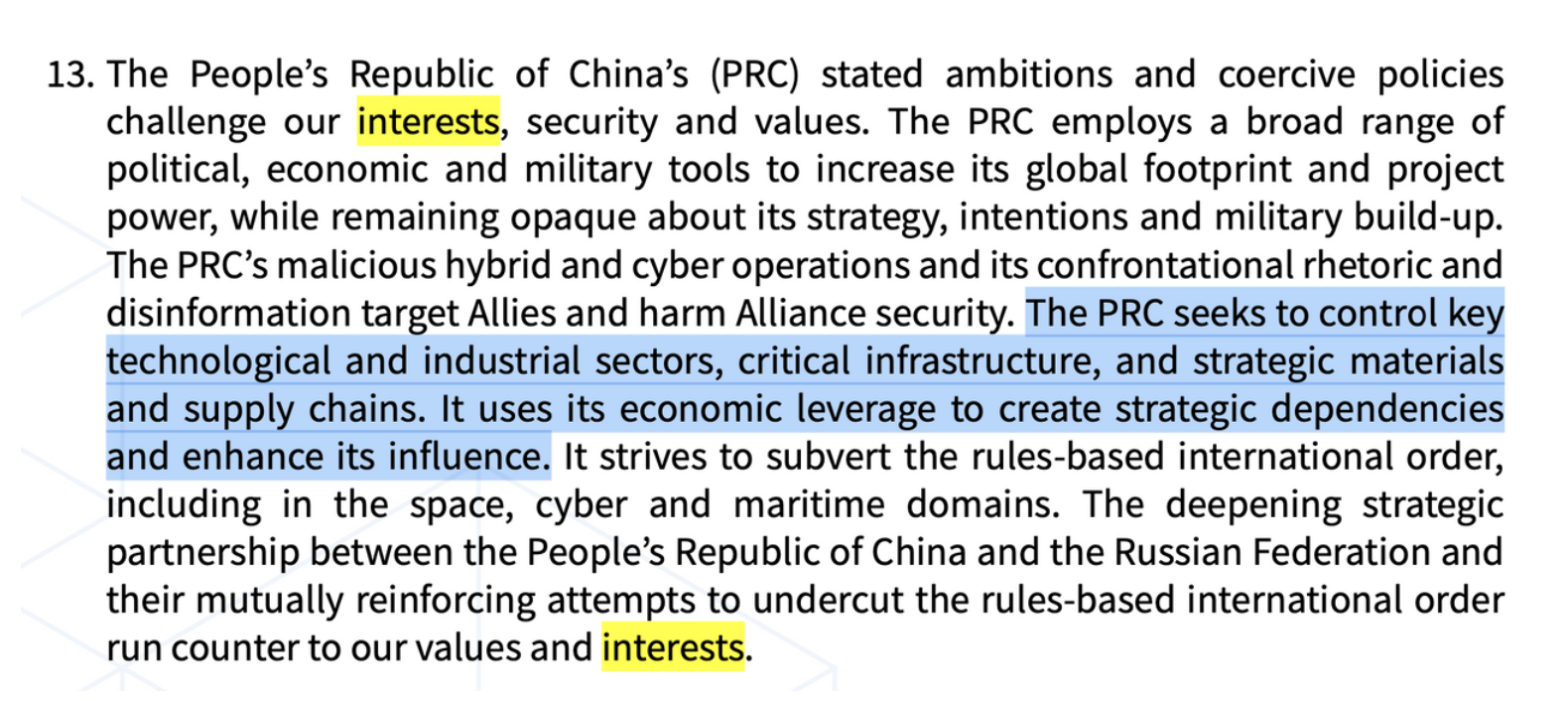
Tonul este total schimbat. Nu se mai folosesc cuvinte frumoase:
” Securitatea euro-atlantică este subminată de concurența strategică și de instabilitatea generalizată.
Războiul brutal de agresiune al Federației Ruse împotriva Ucrainei a spulberat pacea în Europa. Rusia a încălcat normele și principiile care au contribuit la o ordine de securitate europeană stabilă și previzibilă și reprezintă cea mai semnificativă și directă amenințare la adresa securității Aliaților și a păcii și stabilității în zona euro-atlantică.
Ambițiile declarate și politicile coercitive ale Chinei ne provoacă interesele, securitatea și valorile. Aliații vor lucra împreună pentru a aborda provocările sistemice puse de China pentru securitatea euro-atlantică. Aceștia rămân deschiși angajamentului constructiv, în vederea protejării intereselor de securitate ale Alianței și a construirii transparenței reciproce.
Rusia și China dezvoltă un parteneriat strategic și sunt ariergarda unei respingeri autoritare a ordinii internaționale bazate pe reguli“.
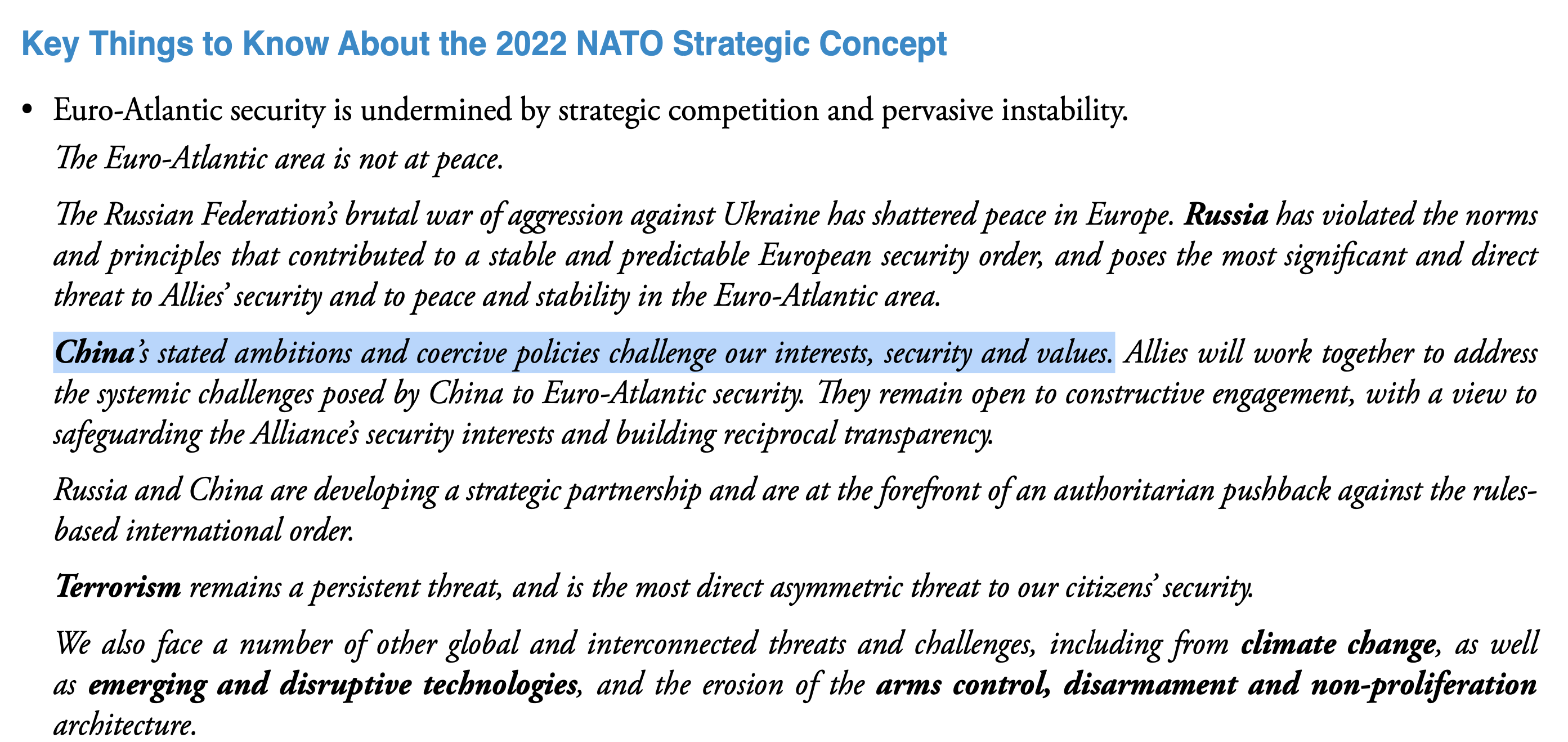
Ca răspuns la provocările la adresa „intereselor” alianței, membrii NATO au promis un program de militarizare care va afecta toate aspectele societății.
„Într-un mediu de competiție strategică, ne vom spori gradul de conștientizare globală și ne vom descuraja, apăra, contesta și respinge în toate domeniile și direcțiile, în conformitate cu abordarea noastră de 360 de grade.”
Documentul mai are si alte lucruri foarte interesante:
„Atâta timp cât vor exista arme nucleare, NATO va rămâne o alianță nucleară”, iar alianța se angajează să „asigure o prezență substanțială și persistentă pe uscat, pe mare și în aer, inclusiv prin consolidarea integrată a apărării antirachetă.”
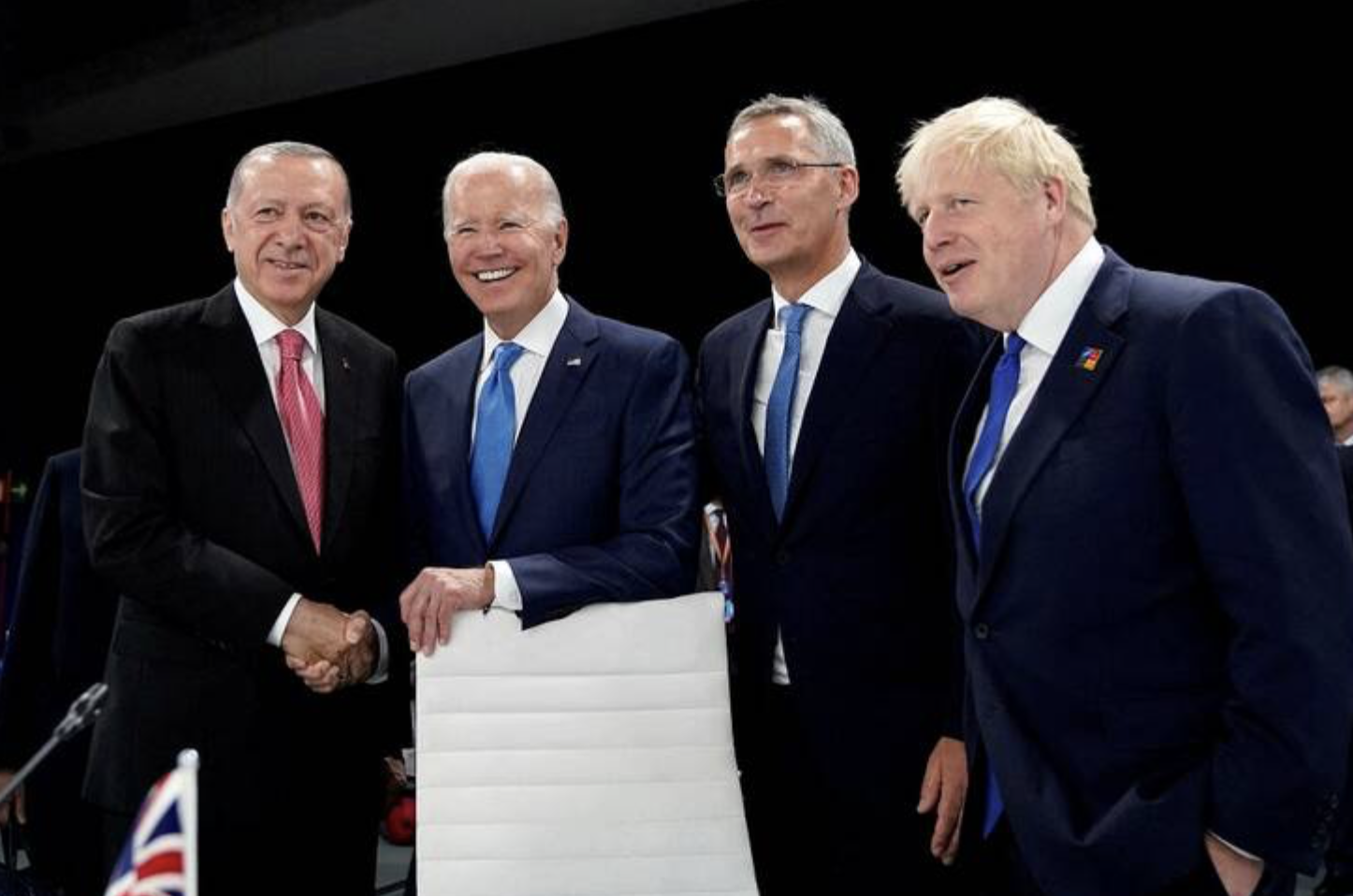
Documentul adaugă că „Poziția de descurajare nucleară a NATO se bazează, de asemenea, pe armele nucleare ale Statelor Unite, desfășurate înainte în Europa și pe contribuțiile aliaților în cauză”.
Atingerea obiectivelor stabilite în document necesită însă o extindere masivă a trupelor, munițiilor și lanțurilor de aprovizionare necesare unui război.
„Vom descuraja și ne vom apăra pe mai departe cu forțe sporite la fața locului, forțe multi-specializate, pregătite pentru luptă, aranjamente îmbunătățite de comandă și control, muniție și echipamente prepoziționate și capacitate și infrastructură îmbunătățite pentru a întări rapid orice Aliat, pe termen scurt sau fără preaviz. ”
Comentariile recente ale președintelui american Joe Biden au fost în concordanță cu tonul acestui document.
La o conferință de presă post-summit, Biden s-a lăudat:
„Am oferit Ucrainei aproape 7 miliarde de dolari în asistență de securitate de când am preluat mandatul. În următoarele câteva zile, intenționăm să trimitem mai mult de 800 de milioane de dolari, inclusiv un nou sistem avansat de apărare aeriană pentru Ucraina, mai multă artilerie și muniție, radare de contrabaterie, muniție suplimentară pentru sistemul de rachete cu lansare multiplă HIMARS pe care îl avem deja dat Ucrainei, care va primi mai multe sisteme HIMARS și din alte țări.”
El a adăugat că angajamentul total al aliaților SUA a inclus „aproape 140.000 de sisteme antitanc, peste 600 de tancuri, aproape 500 de sisteme de artilerie, peste 600.000 de cartușe de muniție de artilerie, precum și sisteme avansate de lansare multiplă de rachete, sisteme antinavă și sisteme de apărare aeriană.”
Tot la conferința de presă, Biden a fost întrebat de un reporter:
„Liderii G7 s-au angajat săptămâna aceasta să susțină Ucraina, citați, „atâta timp cât este nevoie.” Și mă întreb dacă ați putea explica ce înseamnă asta pentru poporul american… „atâta timp cât este nevoie.” Înseamnă sprijin nedeterminat din partea Statelor Unite pentru Ucraina? Sau va veni un moment când va trebui să-i spuneți președintelui Zelensky că Statele Unite nu-i mai pot sprijini țara?”
Biden a răspuns: „Vom sprijini Ucraina atâta timp cât este nevoie”.
Un alt reporter a întrebat despre „prețul ridicat al benzinei în Statele Unite și în întreaga lume… Cât timp este corect să ne așteptăm ca șoferii americani și șoferii din întreaga lume să “plătească” supracostul benzinei pentru acest război?”
Biden a reiterat: „Atâta timp cât este nevoie”.
Notă: Aveți mai jos întregul document strategic adoptat la summitul NATO de la Madrid, în versiunea originală:
NATO 2022 STRATEGIC CONCEPT
Purpose and Principles
1. NATO is determined to safeguard the freedom and security of Allies. Its key purpose and greatest responsibility is to ensure our collective defence, against all threats, from all directions. We are a defensive Alliance.
2. The transatlantic bond between our nations is indispensable to our security. We are bound together by common values: individual liberty, human rights, democracy and the rule of law. We remain firmly committed to the purposes and principles of the Charter of the United Nations and the North Atlantic Treaty.
3. NATO is the unique, essential and indispensable transatlantic forum to consult, coordinate and act on all matters related to our individual and collective security. We will strengthen our Alliance based on our indivisible security, solidarity, and ironclad commitment to defend each other, as enshrined in Article 5 of the North Atlantic Treaty. Our ability to deter and defend is the backbone of that commitment.
4. NATO will continue to fulfil three core tasks: deterrence and defence; crisis prevention and management; and cooperative security. These are complementary to ensure the collective defence and security of all Allies.
5. We will enhance our individual and collective resilience and technological edge. These efforts are critical to fulfil the Alliance’s core tasks. We will promote good governance and integrate climate change, human security and the Women, Peace, and Security agenda across all our tasks. We will continue to advance gender equality as a reflection of our values.
Strategic Environment
6. The Euro-Atlantic area is not at peace. The Russian Federation has violated the norms and principles that contributed to a stable and predictable European security order. We cannot discount the possibility of an attack against Allies’ sovereignty and territorial integrity. Strategic competition, pervasive instability and recurrent shocks define our broader security environment. The threats we face are global and interconnected.
7. Authoritarian actors challenge our interests, values and democratic way of life. They are investing in sophisticated conventional, nuclear and missile capabilities, with little transparency or regard for international norms and commitments. Strategic competitors test our resilience and seek to exploit the openness, interconnectedness and digitalisation of our nations. They interfere in our democratic processes and institutions and target the security of our citizens through hybrid tactics, both directly and through proxies. They conduct malicious activities in cyberspace and space, promote disinformation campaigns, instrumentalise migration, manipulate energy supplies and employ economic coercion. These actors are also at the forefront of a deliberate effort to undermine multilateral norms and institutions and promote authoritarian models of governance.
8. The Russian Federation is the most significant and direct threat to Allies’ security and to peace and stability in the Euro-Atlantic area. It seeks to establish spheres of influence and direct control through coercion, subversion, aggression and annexation. It uses conventional, cyber and hybrid means against us and our partners. Its coercive military posture, rhetoric and proven willingness to use force to pursue its political goals undermine the rules-based international order. The Russian Federation is modernising its nuclear forces and expanding its novel and disruptive dual-capable delivery systems, while employing coercive nuclear signalling. It aims to destabilise countries to our East and South. In the High North, its capability to disrupt Allied reinforcements and freedom of navigation across the North Atlantic is a strategic challenge to the Alliance. Moscow’s military build-up, including in the Baltic, Black and Mediterranean Sea regions, along with its military integration with Belarus, challenge our security and interests.
9. NATO does not seek confrontation and poses no threat to the Russian Federation. We will continue to respond to Russian threats and hostile actions in a united and responsible way. We will significantly strengthen deterrence and defence for all Allies, enhance our resilience against Russian coercion and support our partners to counter malign interference and aggression. In light of its hostile policies and actions, we cannot consider the Russian Federation to be our partner. However, we remain willing to keep open channels of communication with Moscow to manage and mitigate risks, prevent escalation and increase transparency. We seek stability and predictability in the Euro-Atlantic area and between NATO and the Russian Federation. Any change in our relationship depends on the Russian Federation halting its aggressive behaviour and fully complying with international law.
10. Terrorism, in all its forms and manifestations, is the most direct asymmetric threat to the security of our citizens and to international peace and prosperity. Terrorist organisations seek to attack or inspire attacks against Allies. They have expanded their networks, enhanced their capabilities and invested in new technologies to improve their reach and lethality. Non-state armed groups, including transnational terrorist networks and state supported actors, continue to exploit conflict and weak governance to recruit, mobilise and expand their foothold.
11. Conflict, fragility and instability in Africa and the Middle East directly affect our security and the security of our partners. NATO’s southern neighbourhood, particularly the Middle East, North Africa and Sahel regions, faces interconnected security, demographic, economic and political challenges. These are aggravated by the impact of climate change, fragile institutions, health emergencies and food insecurity. This situation provides fertile ground for the proliferation of non-state armed groups, including terrorist organisations. It also enables destabilising and coercive interference by strategic competitors.
12. Pervasive instability results in violence against civilians, including conflict-related sexual violence, as well as attacks against cultural property and environmental damage. It contributes to forced displacement, fuelling human trafficking and irregular migration. These trends pose serious transnational and humanitarian challenges. They undermine human and state security and have a disproportionate impact on women, children and minority groups.
13. The People’s Republic of China’s (PRC) stated ambitions and coercive policies challenge our interests, security and values. The PRC employs a broad range of political, economic and military tools to increase its global footprint and project power, while remaining opaque about its strategy, intentions and military build-up. The PRC’s malicious hybrid and cyber operations and its confrontational rhetoric and disinformation target Allies and harm Alliance security. The PRC seeks to control key technological and industrial sectors, critical infrastructure, and strategic materials and supply chains. It uses its economic leverage to create strategic dependencies and enhance its influence. It strives to subvert the rules-based international order, including in the space, cyber and maritime domains. The deepening strategic partnership between the People’s Republic of China and the Russian Federation and their mutually reinforcing attempts to undercut the rules-based international order run counter to our values and interests.
14. We remain open to constructive engagement with the PRC, including to build reciprocal transparency, with a view to safeguarding the Alliance’s security interests. We will work together responsibly, as Allies, to address the systemic challenges posed by the PRC to Euro-Atlantic security and ensure NATO’s enduring ability to guarantee the defence and security of Allies. We will boost our shared awareness, enhance our resilience and preparedness, and protect against the PRC’s coercive tactics and efforts to divide the Alliance. We will stand up for our shared values and the rules-based international order, including freedom of navigation.
15. Cyberspace is contested at all times. Malign actors seek to degrade our critical infrastructure, interfere with our government services, extract intelligence, steal intellectual property and impede our military activities.
16. Strategic competitors and potential adversaries are investing in technologies that could restrict our access and freedom to operate in space, degrade our space capabilities, target our civilian and military infrastructure, impair our defence and harm our security.
17. Emerging and disruptive technologies bring both opportunities and risks. They are altering the character of conflict, acquiring greater strategic importance and becoming key arenas of global competition. Technological primacy increasingly influences success on the battlefield.
18. The erosion of the arms control, disarmament and non-proliferation architecture has negatively impacted strategic stability. The Russian Federation’s violations and selective implementation of its arms control obligations and commitments have contributed to the deterioration of the broader security landscape. The potential use of Chemical, Biological, Radiological and Nuclear materials or weapons against NATO by hostile state and non-state actors remains a threat to our security. Iran and North Korea continue to develop their nuclear and missile programmes. Syria, North Korea and the Russian Federation, along with non-state actors, have resorted to the use of chemical weapons. The PRC is rapidly expanding its nuclear arsenal and is developing increasingly sophisticated delivery systems, without increasing transparency or engaging in good faith in arms control or risk reduction.
19. Climate change is a defining challenge of our time, with a profound impact on Allied security. It is a crisis and threat multiplier. It can exacerbate conflict, fragility and geopolitical competition. Increasing temperatures cause rising sea levels, wildfires and more frequent and extreme weather events, disrupting our societies, undermining our security and threatening the lives and livelihoods of our citizens. Climate change also affects the way our armed forces operate. Our infrastructure, assets and bases are vulnerable to its effects. Our forces need to operate in more extreme climate conditions and our militaries are more frequently called upon to assist in disaster relief.
NATO’s Core Tasks Deterrence and Defence
20. While NATO is a defensive Alliance, no one should doubt our strength and resolve to defend every inch of Allied territory, preserve the sovereignty and territorial integrity of all Allies and prevail against any aggressor. In an environment of strategic competition, we will enhance our global awareness and reach to deter, defend, contest and deny across all domains and directions, in line with our 360-degree approach. NATO’s deterrence and defence posture is based on an appropriate mix of nuclear, conventional and missile defence capabilities, complemented by space and cyber capabilities. It is defensive, proportionate and fully in line with our international commitments. We will employ military and non-military tools in a proportionate, coherent and integrated way to respond to all threats to our security in the manner, timing and in the domain of our choosing.
21. We will significantly strengthen our deterrence and defence posture to deny any potential adversary any possible opportunities for aggression. To that end, we will ensure a substantial and persistent presence on land, at sea, and in the air, including through strengthened integrated air and missile defence. We will deter and defend forward with robust in-place, multi-domain, combat-ready forces, enhanced command and control arrangements, prepositioned ammunition and equipment and improved capacity and infrastructure to rapidly reinforce any Ally, including at short or no notice. We will adjust the balance between in-place forces and reinforcement to strengthen deterrence and the Alliance’s ability to defend. Commensurate with the threats we face, we will ensure our deterrence and defence posture remains credible, flexible, tailored and sustainable.
22. We will continue to enhance the collective readiness, responsiveness, deployability, integration and interoperability of our forces. We will individually and collectively deliver the full range of forces, capabilities, plans, resources, assets and infrastructure needed for deterrence and defence, including for high-intensity, multi-domain warfighting against nuclear-armed peer-competitors. We will ensure a robust, resilient and integrated command structure, increase the alignment of national and NATO defence plans and strengthen and modernise the NATO force structure. We will strengthen training and exercising, adapt and streamline our decision-making processes, enhance our planning and improve the effectiveness of our crisis response system.
23. Maritime security is key to our peace and prosperity. We will strengthen our posture and situational awareness to deter and defend against all threats in the maritime domain, uphold freedom of navigation, secure maritime trade routes and protect our main lines of communications.
24. We will expedite our digital transformation, adapt the NATO Command Structure for the information age and enhance our cyber defences, networks and infrastructure. We will promote innovation and increase our investments in emerging and disruptive technologies to retain our interoperability and military edge. We will work together to adopt and integrate new technologies, cooperate with the private sector, protect our innovation ecosystems, shape standards and commit to principles of responsible use that reflect our democratic values and human rights.
25. Maintaining secure use of and unfettered access to space and cyberspace are key to effective deterrence and defence. We will enhance our ability to operate effectively in space and cyberspace to prevent, detect, counter and respond to the full spectrum of threats, using all available tools. A single or cumulative set of malicious cyber activities; or hostile operations to, from, or within space; could reach the level of armed attack and could lead the North Atlantic Council to invoke Article 5 of the North Atlantic Treaty. We recognise the applicability of international law and will promote responsible behaviour in cyberspace and space. We will also boost the resilience of the space and cyber capabilities upon which we depend for our collective defence and security.
26. We will pursue a more robust, integrated and coherent approach to building national and Alliance-wide resilience against military and non-military threats and challenges to our security, as a national responsibility and a collective commitment rooted in Article 3 of the North Atlantic Treaty. We will work towards identifying and mitigating strategic vulnerabilities and dependencies, including with respect to our critical infrastructure, supply chains and health systems. We will enhance our energy security and invest in a stable and reliable energy supply, suppliers and sources. We will ensure civil preparedness to provide for continuity of government, the delivery of essential services to our populations and civil support to our armed forces. We will boost our capacity to prepare for, resist, respond to, and quickly recover from strategic shocks and disruptions, and ensure the continuity of the Alliance’s activities.
27. We will invest in our ability to prepare for, deter, and defend against the coercive use of political, economic, energy, information and other hybrid tactics by states and nonstate actors. Hybrid operations against Allies could reach the level of armed attack and could lead the North Atlantic Council to invoke Article 5 of the North Atlantic Treaty. We will continue to support our partners to counter hybrid challenges and seek to maximise synergies with other relevant actors, such as the European Union.
28. The fundamental purpose of NATO’s nuclear capability is to preserve peace, prevent coercion and deter aggression. Nuclear weapons are unique. The circumstances in which NATO might have to use nuclear weapons are extremely remote. Any employment of nuclear weapons against NATO would fundamentally alter the nature of a conflict. The Alliance has the capabilities and resolve to impose costs on an adversary that would be unacceptable and far outweigh the benefits that any adversary could hope to achieve.
29. The strategic nuclear forces of the Alliance, particularly those of the United States, are the supreme guarantee of the security of the Alliance. The independent strategic nuclear forces of the United Kingdom and France have a deterrent role of their own and contribute significantly to the overall security of the Alliance. These Allies’ separate centres of decision-making contribute to deterrence by complicating the calculations of potential adversaries. NATO’s nuclear deterrence posture also relies on the United States’ nuclear weapons forward-deployed in Europe and the contributions of Allies concerned. National contributions of dual capable aircraft to NATO’s nuclear deterrence mission remain central to this effort.
30. NATO will take all necessary steps to ensure the credibility, effectiveness, safety and security of the nuclear deterrent mission. The Alliance is committed to ensuring greater integration and coherence of capabilities and activities across all domains and the spectrum of conflict, while reaffirming the unique and distinct role of nuclear deterrence. NATO will continue to maintain credible deterrence, strengthen its strategic communications, enhance the effectiveness of its exercises and reduce strategic risks.
31. We will continue to invest in our defence against chemical, biological, radiological and nuclear threats. We will enhance our policies, plans, training and exercises and assess our capabilities to ensure that these requirements are integrated into our deterrence and defence posture.
32. Strategic stability, delivered through effective deterrence and defence, arms control and disarmament, and meaningful and reciprocal political dialogue remains essential to our security. Arms control, disarmament, and non-proliferation strongly contribute to the Alliance’s objectives. Allies’ efforts on arms control, disarmament and nonproliferation aim to reduce risk and enhance security, transparency, verification, and compliance. We will pursue all elements of strategic risk reduction, including promoting confidence building and predictability through dialogue, increasing understanding, and establishing effective crisis management and prevention tools. These efforts will take the prevailing security environment and the security of all Allies into account and complement the Alliance’s deterrence and defence posture. We will make use of NATO as a platform for in-depth discussion and close consultations on arms control efforts.
33. The Nuclear Non-Proliferation Treaty is the essential bulwark against the spread of nuclear weapons and we remain strongly committed to its full implementation, including Article VI. NATO’s goal is to create the security environment for a world without nuclear weapons, consistent with the goals of the Nuclear Non-Proliferation Treaty.
34. Countering terrorism is essential to our collective defence. NATO’s role in the fight against terrorism contributes to all three core tasks and is integral to the Alliance’s 360-degree approach to deterrence and defence. Terrorist organisations threaten the security of our populations, forces and territory. We will continue to counter, deter, defend and respond to threats and challenges posed by terrorist groups, based on a combination of prevention, protection and denial measures. We will enhance cooperation with the international community, including the United Nations and the European Union, to tackle the conditions conducive to the spread of terrorism.
Crisis Prevention and Management
35. NATO Allies have a shared interest in contributing to stability and managing conflicts together through NATO. We will continue to work to prevent and respond to crises when these have the potential to affect Allied security. We will build on the unique capabilities and expertise we have acquired in crisis management. To that end, we will invest in crisis response, preparedness and management, through regular exercises and leverage our ability to coordinate, conduct sustain and support multinational crisis response operations.
36. We will ensure the resources, capabilities, training and command and control arrangements to deploy and sustain military and civilian crisis management, stabilisation and counter-terrorism operations, including at strategic distance. Building on the lessons learned over the past three decades, including through our operations in Afghanistan, we will continue to improve our readiness, our military and civilian capabilities and civil-military planning and coordination. We will further develop the Alliance’s ability to support civilian crisis management and relief operations and to prepare for the effects of climate change, food insecurity and health emergencies on Allied security. This will allow us to respond to any contingency at short notice.
37. Partners make an important contribution to NATO-led crisis management. We will continue to ensure sustained political engagement and military interoperability with partners who express an interest in contributing to our missions and operations.
38. We will increase our efforts to anticipate and prevent crises and conflicts. Prevention is a sustainable way to contribute to stability and Allied security. We will enhance support for our partners, including to help build their capacity to counter terrorism and address shared security challenges. We will scale up the size and scope of our security and capacity-building assistance to vulnerable partners in our neighbourhood and beyond, to strengthen their preparedness and resilience and boost their capabilities to counter malign interference, prevent destabilisation and counter aggression.
39. Human security, including the protection of civilians and civilian harm mitigation, is central to our approach to crisis prevention and management. We will work with other international actors to address the broader conditions fuelling crises and pervasive instability and contribute to stabilisation and reconstruction. We will reinforce our coordination and cooperation with the United Nations and the European Union, as well as with other regional organisations such as the Organisation for Security and Co-operation in Europe and the African Union. Cooperative Security
40. NATO’s enlargement has been a historic success. It has strengthened our Alliance, ensured the security of millions of European citizens and contributed to peace and stability in the Euro-Atlantic area. We reaffirm our Open Door policy, consistent with Article 10 of the North Atlantic Treaty, as an expression of our fundamental values and our strategic interest in Euro-Atlantic peace and stability. Our door remains open to all European democracies that share the values of our Alliance, which are willing and able to assume the responsibilities and obligations of membership, and whose membership contributes to our common security. Decisions on membership are taken by NATO Allies and no third party has a say in this process.
41. The security of countries aspiring to become members of the Alliance is intertwined with our own. We strongly support their independence, sovereignty and territorial integrity. We will strengthen political dialogue and cooperation with those who aim to join the Alliance, help strengthen their resilience against malign interference, build their capabilities, and enhance our practical support to advance their EuroAtlantic aspirations. We will continue to develop our partnerships with Bosnia and Herzegovina, Georgia and Ukraine to advance our common interest in Euro-Atlantic peace, stability and security. We reaffirm the decision we took at the 2008 Bucharest Summit and all subsequent decisions with respect to Georgia and Ukraine.
42. Political dialogue and practical cooperation with partners, based on mutual respect and benefit, contribute to stability beyond our borders, enhance our security at home and support NATO’s core tasks. Partnerships are crucial to protect the global commons, enhance our resilience and uphold the rules-based international order.
43. The European Union is a unique and essential partner for NATO. NATO Allies and EU members share the same values. NATO and the EU play complementary, coherent and mutually reinforcing roles in supporting international peace and security. On the basis of our longstanding cooperation, we will enhance the NATO-EU strategic partnership, strengthen political consultations and increase cooperation on issues of common interest, such as military mobility, resilience, the impact of climate change on security, emerging and disruptive technologies, human security, the Women, Peace and Security agenda, as well as countering cyber and hybrid threats and addressing the systemic challenges posed by the PRC to Euro-Atlantic security. For the development of the strategic partnership between NATO and the EU, nonEU Allies’ fullest involvement in EU defence efforts is essential. NATO recognises the value of a stronger and more capable European defence that contributes positively to transatlantic and global security and is complementary to, and interoperable with NATO. Initiatives to increase defence spending and develop coherent, mutually reinforcing capabilities, while avoiding unnecessary duplications, are key to our joint efforts to make the Euro-Atlantic area safer.
44. We will strengthen our ties with partners that share the Alliance’s values and interest in upholding the rules-based international order. We will enhance dialogue and cooperation to defend that order, uphold our values and protect the systems, standards and technologies on which they depend. We will increase outreach to countries in our broader neighbourhood and across the globe and remain open to engagement with any country or organisation, when doing so could bolster our mutual security. Our approach will remain interest-driven, flexible, focused on addressing shared threats and challenges, and able to adapt to changing geopolitical realities.
45. The Western Balkans and the Black Sea region are of strategic importance for the Alliance. We will continue to support the Euro-Atlantic aspirations of interested countries in these regions. We will enhance efforts to bolster their capabilities to address the distinct threats and challenges they face and boost their resilience against malign third-party interference and coercion. We will work with partners to tackle shared security threats and challenges in regions of strategic interest to the Alliance, including the Middle East and North Africa and the Sahel regions. The Indo-Pacific is important for NATO, given that developments in that region can directly affect EuroAtlantic security. We will strengthen dialogue and cooperation with new and existing partners in the Indo-Pacific to tackle cross-regional challenges and shared security interests.
46. NATO should become the leading international organisation when it comes to understanding and adapting to the impact of climate change on security. The Alliance will lead efforts to assess the impact of climate change on defence and security and address those challenges. We will contribute to combatting climate change by reducing greenhouse gas emissions, improving energy efficiency, investing in the transition to clean energy sources and leveraging green technologies, while ensuring military effectiveness and a credible deterrence and defence posture. Ensuring the Alliance’s Continued Success
47. Investing in NATO is the best way to ensure the enduring bond between European and North American Allies, while contributing to global peace and stability. We will continue to reinforce our political unity and solidarity and to broaden and deepen our consultations to address all matters that affect our security. We commit to reinforce consultations when the security and stability of an Ally is threatened or when our fundamental values and principles are at risk.
48. We will share equitably responsibilities and risks for our defence and security. We will provide all the necessary resources, infrastructure, capabilities and forces to deliver fully on our core tasks and implement our decisions. We will ensure our nations meet the commitments under the Defence Investment Pledge, in its entirety, to provide the full range of required capabilities. We will build on the progress made to ensure that increased national defence expenditures and NATO common funding will be commensurate with the challenges of a more contested security order.
49. NATO is indispensable to Euro-Atlantic security. It guarantees our peace, freedom and prosperity. As Allies, we will continue to stand together to defend our security, values, and democratic way of life
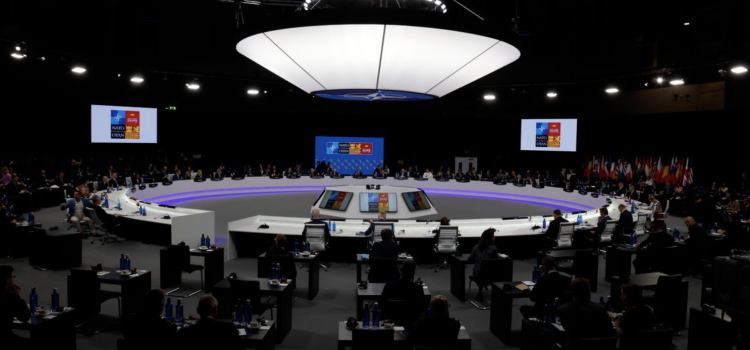

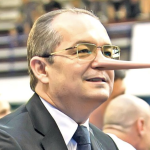
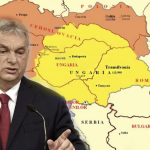
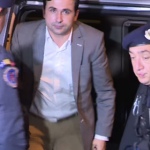
Eu am invatat din istorie, de la bunici, de la batrani ca Romania si China sunt aliati vechi si naturali din cauza faptului ca amandoua tarile s-au ajutat reciproc la greu si amandoua sunt vecine cu obezul imperiu rusoid populat de urukhai.
De ce Romania si-a demolat la modul cel mai rusinos, provincial, slugarnic si infect relatia privilegiata cu China? Cand China ne-a aparat de invazia ruseasca? Nimeni de pe globul pamantesc, nicio tara, niciun alt popor nu a aparat Romania de o invazie ruseasca inafara de China. Nimeni nu ar fi varsat sange pentru tara asta straina, dar China era singura gata sa o faca la 23 august 1968.
Cand China a avut secretari, ministri, presedinti care stiau romaneste, stiau de Romania, au invatat in Romania? Si este prima economie a lumii la GDP PPP? Cu ei ne luam la tranta? De ce?
Cum a ajuns NATO sa defineasca drept “inamic” “provocare” exact acele state pe care SUA vrea sa le domine, subjuge, distruga, colonizeze?
De ce trebuie ca inamicii americii sa devina si inamicii Romaniei si a tarilor europene?
Ce legatura are NATO cu China, cu Asia? Ce legatura are Japonia, Coreea de Sud cu NATO, cu Europa?
Ce problema a avut sau are Romania cu lumea asiatica, cu lumea araba, cu lumea sud americana, cu lumea africana? De ce sa ne punem atatea tari in cap?
De ce trebuie sa fim noi inamici cu orice stat pe care este suparat SUA?
Acum inteleg de ce Macron a spus in 2016 ca NATO este “in moarte cerebrala” si este nevoie de “o armata europeana”. Imi este frica daca Viktor Orban, din nou, istoria ii va da dreptate despre Ucraina, Rusia, NATO, China. Pana acum omul a fost vizionar si pentru noi este un cosmar hitcockian pentru ca succesul lui ne sapa la temelie incet, dar sigur.
“Razboiul cu China” NU ESTE RAZBOIUL ROMANIEI ! Si nu cred ca este razboiul Europei, inamicii americii nu sunt inamicii Europei. Interesele americane nu sunt interese europene si viceversa.